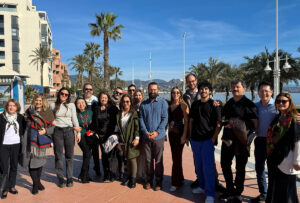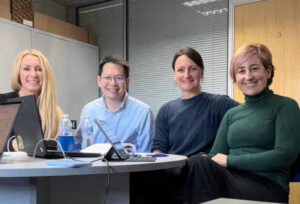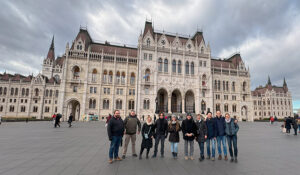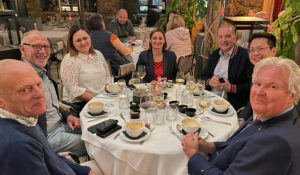Marine scientist Michelle Grey graduated with a Bsc in Environmental Science, from Warnborough College. Originally from the USA, she first began a biochemistry course but when life took unexpected turns, she put her degree on the back-burner. Later on, with children at school, Michelle met a new partner from England. After relocating to the UK, she found a job at Gardline Marine Sciences and started looking around for opportunities to complete her studies.
You can here Michelle’s Interview podcast here or read the transcript below it.
Can you just say a little bit about what you do?
I am the laboratory supervisor, so I train offshore Scientists on certain procedures that have to do with the testing of seabed sediment. We do this for a survey, which would be before a well or pipeline would be put in. It’s mainly for oil and gas, but we’re also doing wind farms now. For them to meet the legislation that is out there for the environment to be protected, we’ll do what we called a baseline survey. After the baseline is done, if it’s OK to go ahead with the project, we’d then get hired to continue on giving our feedback, if the area’s being changed at all, and how drastically that might be being changed.
Is it local to the UK?
It used to be primarily North Sea but we’re worldwide now so we’ve jobs down in Australia, we’ve got jobs down in the US, we’ve done some Mediterranean jobs. We had a job out in the Black Sea – because we take macrofauna samples to determine what species are living there. We had to send the samples off because there was no taxonomist that specialises in the Black Sea. We sent them off to Natural England and they had us in to visit. We found they had hundreds of first-time surveyed species. We were quite excited about that.
I guess it is exciting, because the sea is one area people are still making discoveries in. Is this something that you have always been interested in?
I was always going for biochemistry. Biochemistry was what I wanted to get in to because I saw too many of my family members suffer through cancer. What I really wanted to do was cancer research. So, when I was nineteen, I went from high school to a church-run institute that my parents then got a discount on. They didn’t offer biochemistry, so they suggested I did two years there and then transfer over to a four-year institution that would have the biochemistry. So I studied Biology and Chemistry side-by-side, so I was basically doing it in halves. But then, life happens. I met somebody, got married, started a family and postponed my degree because he was the breadwinner. After my children got into full-time education (it was always in my mind), once they were looked after during the day, I would then start taking part time classes and get my degree finished. And it went from there.
Why did you decide to do a distance degree?
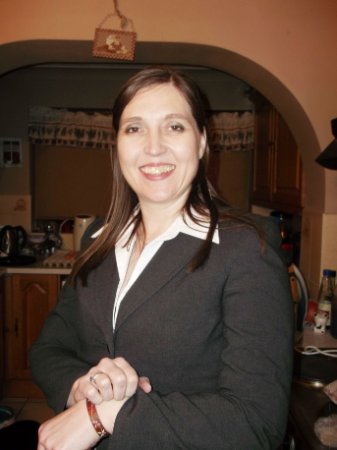
Well, only because of the situation I am in now. That marriage didn’t work out. I took my children out of that situation and wound up working for a genetics company in Washington, who weren’t willing to support me financially other than pay me what I was doing… but they gave me time off. So, I was doing night classes and afternoon classes when I could get them and I found that it wasn’t going to happen for biochemistry because you have to have such a free schedule to end up in the lab. I had all my maths taken care of and I had all but one module of chemistry completed. It was the physics that I needed to finish when I met and married my now husband, who is from Great Yarmouth, England. That was right after 911. 911 caused a lot of havoc in America, especially in industries. My husband is an engineer, so he was trying to find a job Stateside – keep the children near what they were used to. I would continue working and he would come out and find a job. What happened was the company I was working for, got dissolved. That left me without a job. Then we went to plan B, which was to come over here and we would set it as an opportunity, not just for our marriage to flourish but for our children to have a chance to live in a different country. It really did help them a lot. I think the education they got here was far better. My bosses found out I was going to be moving here and said that if I finished my degree in Science, that would be much more of an advantage to me than doing getting an American degree.
Why did you decided to do it with Warnborough?
Well, I was looking online because I had found a job here at Gardline as an assistant laboratory technician. I talked to them about how they would feel if I went back to school, because that was still on my mind that it was what I wanted to do. I was halfway there according to the credit system in America. I started looking into the options. They weren’t willing for me to take time off but they were willing to pay for it. So here I was in a different situation. I was going to have the funding but not the time.
I looked at the Open University and I was going to finish Biochemistry but then your Environmental Science kept coming up in the searches for Biochemistry – because you offer three different modules for biochemistry. It was the only one I could find. When I saw that it was Environmental Science, I wasn’t put off by that because that would actually help with my career here. This is an environmental company. I thought, well, that’s going to be OK. They had just mentioned that if I beefed up what I was hired to beef up, which was the particle size analysis and that once that was done there was the possibility that I would be made supervisor. I was looking long-term at staying here with the company and possibly managing the lab, if that every became an opportunity. That was why, it just seemed to tick all the boxes and I was able to choose distance learning. I could do the tests here from work and have the adjudicators… everything just kind of fell into place.
Were you able to draw on your work experience when it came to the actual study?
Oh definitely, and from some of my co-workers who had taken some as their majors. Like when I did Animal behaviour, I found out there was a girl who had masters in Animal behaviour, so I was able to talk to her about it. When I did all the Marine science modules – most of the people I work with are marine biologists. So there was a lot of support that I got from work. There were the books, there’s a library here at work that they use for research, for reports they’ve written. I had access to all those books that I used for the coursework. That helped a lot and helped me understand what I was doing here in the lab.
Were you studying full time while working? How was that?
How was that? OK, the first year when I was just (an) assistant, it was perfect because they told me if I didn’t have anything else on, I could have the last couple of hours of each day doing some of the coursework here at work. Once I was made supervisor, which was just about a year into my course, then the time got a little more challenging – because now I was having to train scientists on some of the procedures here. I had to make sure I was meeting deadlines with the samples that were coming in. Because it was my first research project, comparing three different standards for particle size analysis for seabed sediments, we than started to offer these out to the clients, and it doubled our numbers. It was really positive and we started to bring in third party work, which we had never done before. So, that was really good.
What kind of contact did you have when you were doing the course? Did you have contact with a particular person?
The tutors? Oh they were wonderful. Each tutor I had, I could email into the registration office, to the administrator – the same email address I would send my coursework into. I could tell them “Could you give a message to my tutor because I am not sure about this?” Or “Could you ask them if I could do this instead because this isn’t going to work out?” and they would get back to me, usually the next day. They probably would have even talked on the phone if I had had some more time during the day to do that.
Did you have a dissertation or a final project?
I had three during the course. They are called research projects. They were my choice but I had to get them OK’d by the tutor who was in charge of that, who happened to be Dr Julian – for all three of my research papers. I was so lucky to have him as my tutor for that because he gave a lot of good advice and helped me ride along with this. I think the combination of that, put together the amount of work… you can guide it towards the way you want the end result to be, if that makes sense.
Thank you for taking this time out to talk to me today.
Oh you are welcome. I think Warnborough is a wonderful organisation and I feel really pleased to have been able to find it in the first place. It’s helped me reach my goal of getting my BSc, finally, after many years.
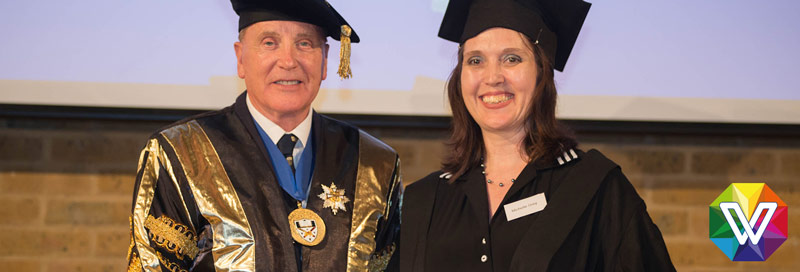
Visit our Bachelor of Science in Environmental Science page for more information.
Our Baccalaureate programmes allow you to work at your own pace, and most importantly, are very hands-on. This is about learning by doing, and every step has to be justified. It is the ideal combination of a vocational and academic programme because you can apply your knowledge to work practice immediately.
Other Baccalaureate programmes offered include:
- Bachelor of Science in Agriculture
- Bachelor of Science in Counselling
- Bachelor of Science in Horticulture
- Bachelor of Arts in Leisure Management

